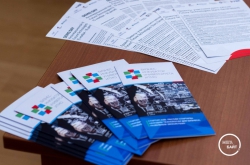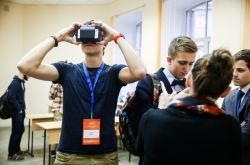"I never imagined that the mining industry can be this cruel"
10 years ago, Matthew - he was still a student studying engineering at Curtin University - got a job at a mining company in Western Australia, about 50 kilometers from Karratha. It was a fly-in fly-out job where he spent two weeks in the mines and then a week of rest in Perth. Such a job gives lots of opportunities, thought Matthew, as it paid well, and he could also apply the skills he got during his university years to practice.
The bus with the newcomers arrived at 11 am. At that time, there were 32 people working on the site. Everything went as usual - they showed Matthew his room, then the office. In three hours, the briefing was interrupted by a phone call.
"At about 2pm, my new boss ran out of the office. One of the workers got sick. Five of his colleagues came to help him, and the helicopter was immediately called to the site, though it arrived only in 90 minutes. Unfortunately, at about 4pm it became obvious that the man's heart stopped, and there was nothing to be done. Later, the police questioned me and the others, on the next day, psychologists arrived. I knew that working in the mining industry is harsh, yet I never knew to what extent," remembers Matthew.
The medics determined the cause of death: dehydration. While working at a temperature above 45 degrees Celsius, the worker didn't drink enough water. After feeling sick, he preferred to lie down and rest, and didn't tell anyone how he felt. The colleagues didn't notice it in time, and the worker himself probably didn't even imagine what could become of this disregard of simple rules.

During eight years of work in the mining industry, Matthew witnessed many cases of occupational injuries. The reason for most of them was the human element: even after all the occupational health and safety training, people often pay no heed to such serious issues. A good solution to the problem could be a device that will gather data on a person's condition and warn him of the possible risks in time. Matthew and his colleague from St. Petersburg - ITMO's graduate Alexei Pavlenko are working on it in the new Soter Analytics Company.
From Australia to St. Petersburg
Yet, the idea of the device came some time later. After working in Australia, Matthew went to France to get his MBA. At that time, Alexei was working on different projects, as well. The developers met by accident - when presenting their projects at the shortlisting for the Finnish Startup Sauna accelerator. None of them passed, yet they understood that they should work on their business together. To begin with, they decided to finalize Matthew's idea and create a special technology that would allow receiving data from trucks that work in the quarry, where there is no Wi-Fi, 2G or 3G. After creating a prototype, they presented it to potential clients in Australia. Yet, they couldn't find a buyer for it.
Upon returning to St. Petersburg, Matthew and Alexei started working on a new project. Using the Australian engineer's experiences and Russian programmer's competencies, they got the idea of a device that would allow to decrease the occurrence of occupational injuries in industries that rely heavily on manual labor.
 Alexey Pavlenko
Alexey Pavlenko
"There are lots of fitness-trackers on the market that let sportsmen track how fast they run, what is their step length, how many calories they burn and such, yet there is nothing that can be used in situations where people are exposed to real danger, shares Alexei Pavlenko, Soter Analytic's co-founder and chief technical officer. So we thought - can we transfer the technologies used in gadgets like fitness trackers into a device that would trace one's health indicators in real-time? We analyzed the market and found out that there is no device that provides the necessary amount of data and suits these purposes. The only thing we found was a device by Sony that allowed us to use the existing sensors, yet we added our own software which allows analyzing the data a lot deeper".
Matthew’s and Alexei’s invention is a device that collects data on a person's activity in real-time mode. The data is analyzed in the cloud, then, risks are defined. Finally, a system of reports is formed, which can warn a worker about the situation's development and prevent a possible injury. One can watch how the system works under normal conditions as well. Even if there are no threats, the statistics can be seen by using a special application, explains Alexei Pavlenko.
First client and investments
Last June, when the developers only had the idea of the project, they sent an application to the Startup Wise Guys accelerator. As result, their team passed the shortlisting and got into a three-month acceleration program in Riga. There, they developed the idea to the point of having a prototype, attracting investments and signing the first contract.
Startup Wise Guys invested 20,000 Euros in the project; also, a major Australian mining company got interested in it, as well. In the end of February - beginning of March, trial runs of the prototype were run on one of its mining sites.

"We worked in the middle of the desert, with more than 140 workers of the company who operated the colossal mining trucks, planted explosives, searched for new lodes or just worked around the camp. In the end, we tested the device in different situations - from those where people are exposed to real danger to those when someone is just sitting in an office. Those people's work is very interesting; they come from some big Australian city and work 12 hours a day for seven days in the quarry, and only then leave to spend several days at home, shares Alexey Pavlenko. However, the work of the company never stops, the process goes 24 hours a day. This is why even an hour delay due to some emergency costs millions of dollars".
What's next?
It took us a year to develop the idea to the point of having a prototype, as of now, we are finalizing the device; soon we'll be ready to start the production, shares the Soter Analytics co-founder. At the same time, the startup continues to look for investors. This March, Alexei Pavlenko won the ticket to Slush B in Helsinki for the team. This is an event for startups and technological companies that helps new businesses connect with influential international companies, investors and the media.
What's more, the company aspires to be chosen for the Startup Sauna accelerator. There, the developers plan to find new partners from Finland. All in all, Soter Analytics plans to find 500,000 Euros of investments for future development before June 2017. The project's authors aim their product at not just large mining companies, but any enterprises and companies that rely on manual labor.
At the end of April (29-30), the company is organizing its own hackathon on creating the design of a device for those who work close to potentially dangerous autonomous equipment. According to the hackathon's tasks, the device should give the workers an opportunity to just press the crash button and prevent a situation when the equipment can cause harm to anyone. For instance, a worker who got in the way of an autonomous truck will have the opportunity to stop it by notifying the command center. Also, the device has to support information exchange with any type or brand of autonomous equipment.
As Alexei Pavlenko notes, the hackathon will give its participants an opportunity to work on real production tasks, as well as win 50,000 rubles and take part in a salaried internship in the field's largest companies.





